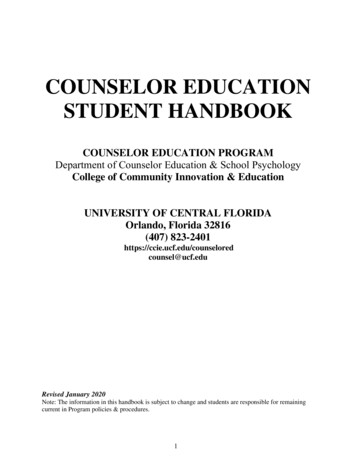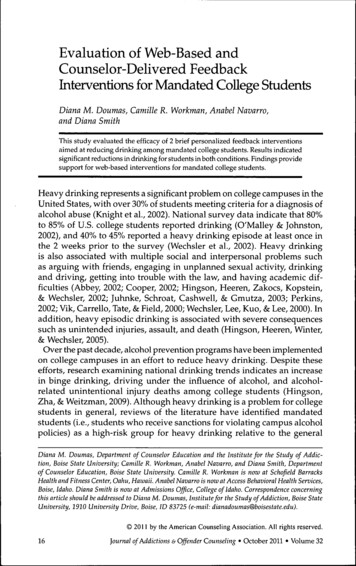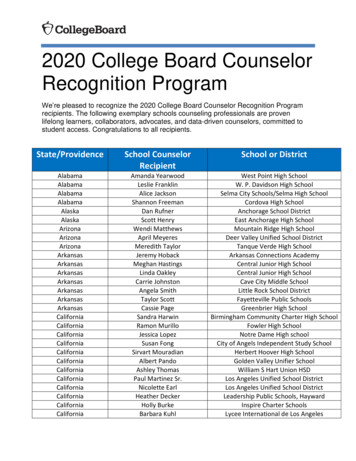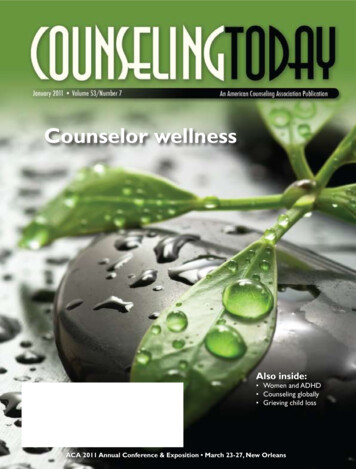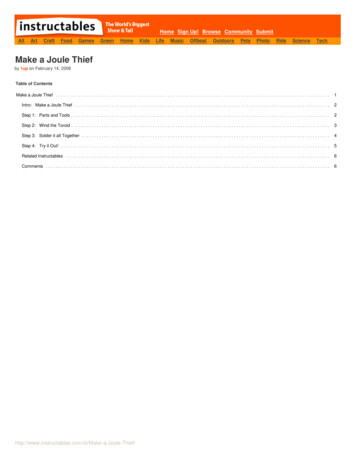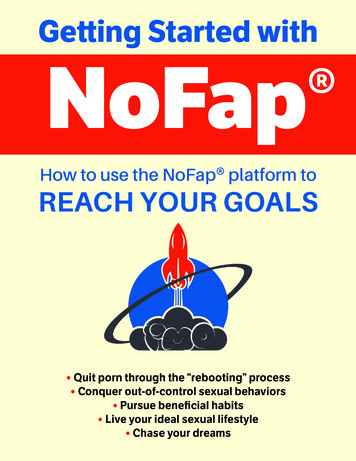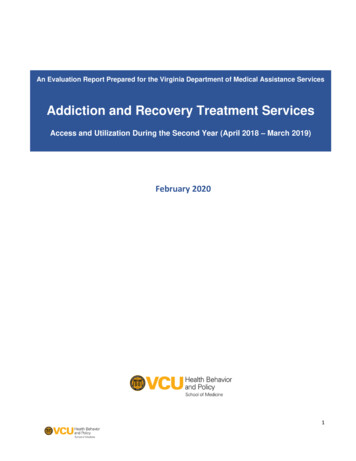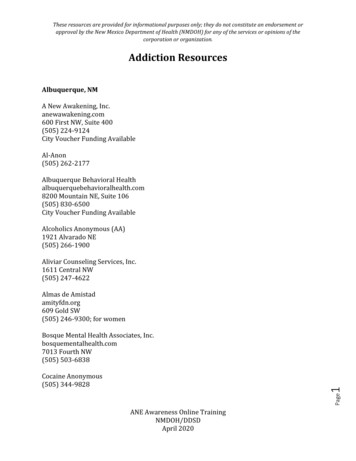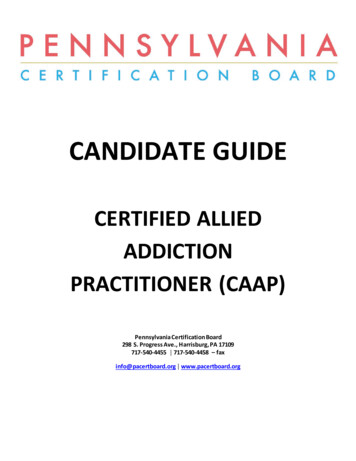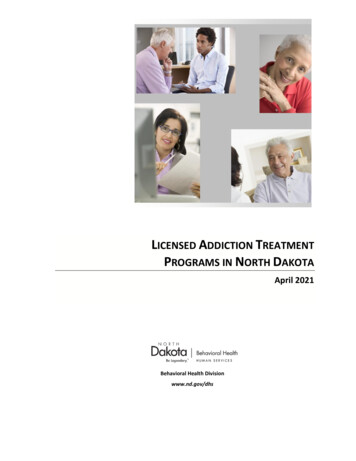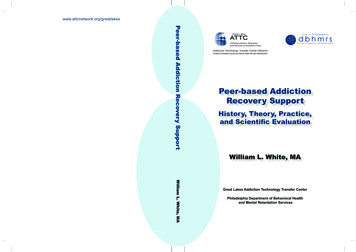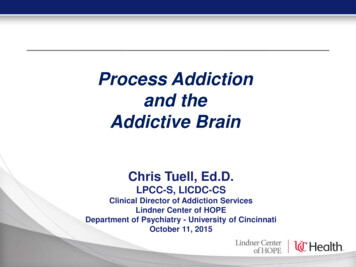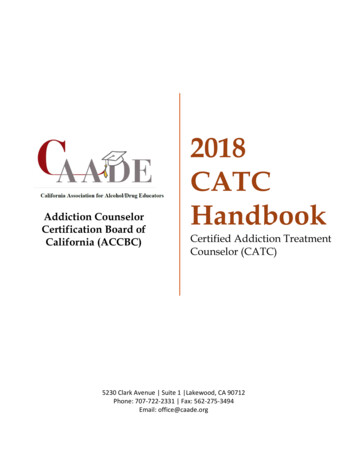
Transcription
Addiction CounselorCertification Board ofCalifornia (ACCBC)2018CATCHandbookCertified Addiction TreatmentCounselor (CATC)5230 Clark Avenue Suite 1 Lakewood, CA 90712Phone: 707-722-2331 Fax: 562-275-3494Email: office@caade.org
Page 1ContentsIntroduction .2About CAADE . 2About ACCBC . 2Purpose & Scope of CATC Certification . 3Impartiality Regarding Training . 3Section 1: How to Apply for CATC Certification .4Registration Requirements. 4CATC Certification Eligibility . 6Eligibility Rationale . 9How to Apply . 10Scheduling an Exam. 11Section 2: Preparing for the Examination . 12How the Exam Was Developed . 12Exam Description. 13Examination Content . 13Sample Questions. 19List of References . 22Section 3: Taking the Exam . 23Taking the Exam . 23Section 4: After the Exam . 26Exam Results Reports . 26Understanding your Score. 26Re-Examination . 27Exam-Related Complaints . 27Section 5: Ethics, Conduct, Complaints & Disciplinary Actions . 28ACCBC Code of Ethics . 28California AOD Counselor Uniform Code of Conduct. 32Complaints and Disciplinary Actions . 34Section 6: Maintaining Your Certification . 40Recertification . 40Recertification Applications . 41Recertification Fee . 42Recertification Acceptance . 42Section 7: ACCBC Policies . 43Accommodations for those with Disabilities . 43Address Changes . 43Confidentiality . 43Reciprocity . 45Reconsideration Requests . 45Statement of Nondiscrimination . 46Use of the Certification Mark . 46Section 8: Forms . 48Special Accommodations Request Form . 48Documentation of Disability-Related Needs Form . 49Consent to Disclose Information from Student Records . 50
Page 2IntroductionThis candidate handbook provides essential information for persons applying for CATC certification andmaintaining the CATC credential once certification is earned.Applicants are advised to read the Handbook, review the exam content outline, and be familiar withreferences listed for the CATC examination. Recognize that laws, rules and standards change over time.It is your responsibility to keep your knowledge current during the course of your future professionalpractice.About CAADEVision StatementThe CAADE Vision is to be a leader in state and national collaborative efforts to improve the overallhealth and welfare of those afflicted with substance related and addictive disorders.Mission StatementCAADE promotes and supports quality higher education in addiction studies by developing andimplementing accreditation standards; providing continuing education and professional development;leading at the state and national levels in the development and implementation of certification andlicensure standards for addiction service professionals; and providing public policy education andadvocacy among consumers and other stakeholders.About ACCBCCAADE established the Addiction Counselor Certification Board of California (ACCBC) on July 22, 2005for the following purposes: the development, implementation and advancement of appropriate alcohol and drug counselorcertification standards and programs; the evaluation of compliance with these standards; the development and identification of resources concerning professional certification of alcoholand drug counselors according to California regulations; and, the advancement of high quality competency assurance through research, education andcommunication activities.The ACCBC is an autonomous decision-making body of the CAADE Board and is responsible forcounselor certification through testing and satisfaction with the administration of the CaliforniaAddictions Treatment Counselor (CATC) exam.
Page 3Purpose & Scope of CATC CertificationThe Certified Addictions Treatment Counselor (CATC) credential identifies any academically trainedspecialist who is able to facilitate behavioral change for persons affected by alcohol and other drugaddictions.Counselors may be physicians, physician assistants, nurses, nurse practitioners, psychologists, socialworkers, psychiatric technicians, marriage and family therapists, certified counselors, or othersproviding they have training or experience in treating persons with substance use disorders.The CATC credential identifies those persons with entry-level practical experience in the areas ofevaluation and assessment, treatment planning, pharmacology of alcohol and other drugs, culturalissues and their relevance, models of intervention, family issues, legal and ethical issues, referrals, andrecordkeeping.Requirements for CATC certification are based on the Department of Health Care Services regulationsthat require certain minimum eligibility requirements. These regulations are included in Chapter 8(commencing with Section 13000), and Amendment of Sections 9846, 10125, and 10564, Division 4,Title 9, California Code of Regulations. CATC requirements meet federal standards and far exceed theminimum state requirements.The CATC certification is available to individuals working in the United States that meet the eligibilityrequirements.Impartiality Regarding TrainingThe ACCBC’s role is to develop and administer certification examinations in order to determine thequalifications of candidates for certification. The ACCBC does not require, provide, approve, accredit, orendorse any specific study guides, review courses, or other examination preparation products.The ACCBC does not accredit, approve, endorse, or recommend any education or training programsand/or products designed or intended to prepare candidates for certification. The ACCBC has noinvolvement in the development or delivery of such programs or products.ACCBC board members do not participate in the development or delivery of any educational or trainingprogram and/or product designed or intended to prepare individuals to take the CATC examination.This includes exam review/exam prep courses and study guides.
Page 4Section 1: How to Apply for CATCCertificationRegistration RequirementsAnyone working in a licensed Alcohol and Other Drugs (AOD) facility in California must register withone of the state-approved certifying bodies when beginning work (this includes volunteers andinterns).In order to volunteer, intern, or work in an Alcohol and Drug Treatment Facility, state law REQUIRESregistration with a state certifying body (CCR, Section 13035 (f)). Individuals currently working orvolunteering at a treatment center that are not registered are in violation and both the individual andtheir facility could face serious penalty. Once registered, individuals have five years from the date ofinitial registration to become fully certified.Individual RegistrationThe CATC-i designates an individual who has passed the CATC Exam and is completing clinical hourstowards their initial certification.Individual Registration is open to those individuals who:1. Did not complete their Alcohol and Drug Studies (ADS) education at a Community College orany accredited (post-secondary institution) ADS program and wish to certify with the ACCBCthrough the equivalency process or;2. Are not attending or have not attended a Community College or any accredited (post-secondaryinstitution) ADS program and would like to legally complete clinical hours towards their initialCATC certification; or3. Are no longer students and wish to be registered to legally complete their clinical hours forcertification.* Beginning March 1, 2014, prior to registering with the ACCBC, all individuals not enrolled in aCommunity College or any accredited (post-secondary institution) ADS program Addiction StudiesProgram must complete a nine (9) hours orientation course consisting of: Three (3) hours of ethicsThree (3) hours of professional boundariesThree (3) hours of confidentialityACCBC pre-registrants who are not enrolled in a Community College or any accredited (post-secondaryinstitution) ADS program must take an orientation course through an accredited institution.
Page 5Student RegistrationStudent Registration is open to all individuals enrolled in, or who have completed a community collegeor any accredited (post-secondary institution) Alcohol and Drug Studies/Addiction Studies program andwho have NOT yet passed the CATC exam. Student registration is also open to all individuals who areenrolled in non-accredited programs and plan on meeting the equivalency requirements.Applications for initial Student Registration must include a copy of unofficial transcripts that clearlyshow enrollment in a community college or any accredited (post-secondary institution) ADS program.Students not enrolled in a fully accredited ADS program will have their transcripts and courseworkevaluated (see Equivalency Evaluation, Policy 205). However, they will be required to complete a 9hour Laws & Ethics Orientation to ensure that all ACCBC registrants are educated to the state ofCalifornia's regulations and laws in regard to addiction specific counseling. This requirement willremain in effect until each program has been individually and formally approved by the ACCBC thattheir curriculum meets ACCBC standards for registration. This applies to Student Registration only.Registration Extension RequestsThe Department of Health Care Services Counselor Certification Regulations Section 13035, item (f)states, “Registrants shall complete certification as an AOD counselor within five (5) years of the initialdate of registration with any certifying organization," and that ACCBC “may allow up to two (2) yearsadditional time from the initial registration date for a leave of absence due to medical problems orother hardships ”.CriteriaExtensions are granted by ACCBC based on the following criteria:The applicant has begun their AOD specific education at a Community College or any accredited (postsecondary institution) ADS program, or equivalent, within their initial five-year registration period. The applicant is within their fifth year of registration. The applicant has not been able to complete the certification process due to some type ofpersonal hardship. The applicant would be able to complete the certification requirements within the time allottedif granted an extension. If the registration is expired or will be within the next 90 days, it must be renewed at this timeby submitting the proper registration form and non-refundable fee.Processing The extension fee is non-refundable whether the request is approved or denied. Extensions are not processed until all required documents have been submitted with thecorrect information and fees have been paid in full. Extensions are granted in 6 month increments at the discretion of the ACCBC.
Page 6 A registrant who wishes to apply for an extension must mail the Extension Request form withthe Registration form. An extension may be granted for one or two years, but it is not always a guarantee that theregistrant will be approved for the extension. If denied, the applicant is no longer eligible for registration, but he/she can continue to pursuehours and take the CATC Exam.In California, it is illegal for any licensed facility to allow a non-registrant to do internship/employedhours. They might get fined if audited; therefore, the member must notify the facility of his/hermembership status and leave it up to the clinical supervisor to decide if they will allow him/her tocontinue hours. The ACCBC will still accept hours from the member when they apply for initialcertification.CATC Certification EligibilityAll candidates for certification must meet all eligibility requirements established by the ACCBC in effectat the time of application for certification. Candidates cannot earn certification without passing thecertification exam.Eligibility RequirementsThe following steps must be completed to earn CATC certification:1. APPLICATION: Submission of a complete CATC Initial Application form that includes:a. Signed and Dated ACCBC Code of Ethicsb. Signed and Dated Scope of Practicec. Signed and Dated Code of Conduct2. EXPERIENCE: Proof of at least 2,240 hours of supervised clinical/field experience hours on theACCBC Summary of Hours form.Supervised experience requirements:a. Experience may include volunteer or paid experience in the field dating back to the first daythe applicant began attending an approved Addiction Studies (ADS) program. Any hoursworked prior to starting the ADS program will not be accepted.b. Work must be in a licensed drug/alcohol treatment center or facility. Practicum/fieldworkhours DO count toward the total 2,240.c. Experience hours must be in evaluation and assessment, treatment planning, pharmacologyof alcohol and other drugs, cultural issues, models of intervention, family issues, legal andethical issues, referrals, and/or record keeping.
Page 7Evidence of experience requires:(I) A signed letter from the applicant’s supervisor(s) verifying the dates, hours, facility name(s),and experiential functions noted on the Summary of Hours forms.(II) Supervisors must be certified alcohol/drug treatment counselors or licensed professionals(MFT, LCSW, LPCC, MD).3. EDUCATION:a. Option 1: Completion of a Community College or any accredited (post-secondary institution)Alcohol and Drug Studies (ADS)/Addiction Studies program that is at least 30 semester unitsin length and that is designed to meet Federal TAP 21 guidelines.b. Option 2:i. Completion of a bachelor’s degree from a regionally accredited college or universityin one of the following areas of study:Addiction Studies, Psychology, Sociology, Counseling, Human Services, CriminalJustice, Nursing, or other related degreeANDii. Completion of the following addiction coursework either as part of, or in addition to,the applicant’s degree: Drugs and Society OR Physiological Effects of Drugs and Alcohol Family & Addiction Intervention, Treatment and Recovery (Treatment of Substance Abuse—clinicalfocus) Co-Occurring Disorders Group Counseling (experiential) Ethics (specific to addiction counseling) Fieldwork or direct experience with AOD clients4. REFERENCES: Three (3) letters of character reference from three different individuals. Referencesfrom family members or current employer are not accepted.5. FEE: Payment of initial non-refundable CATC fee. CAADE membership is not required forcertification.6. EXAM: Passing score on the CATC examination.
Page 8Meeting the RequirementsApplicants are eligible to take the CATC exam after the educational require
2018 CATC Handbook . Certified Addiction Treatment Counselor (CATC) 5230 Clark Avenue Suite 1 Lakewood, CA 90712 Phone: 707-722-2331 Fax: 562-275-3494
